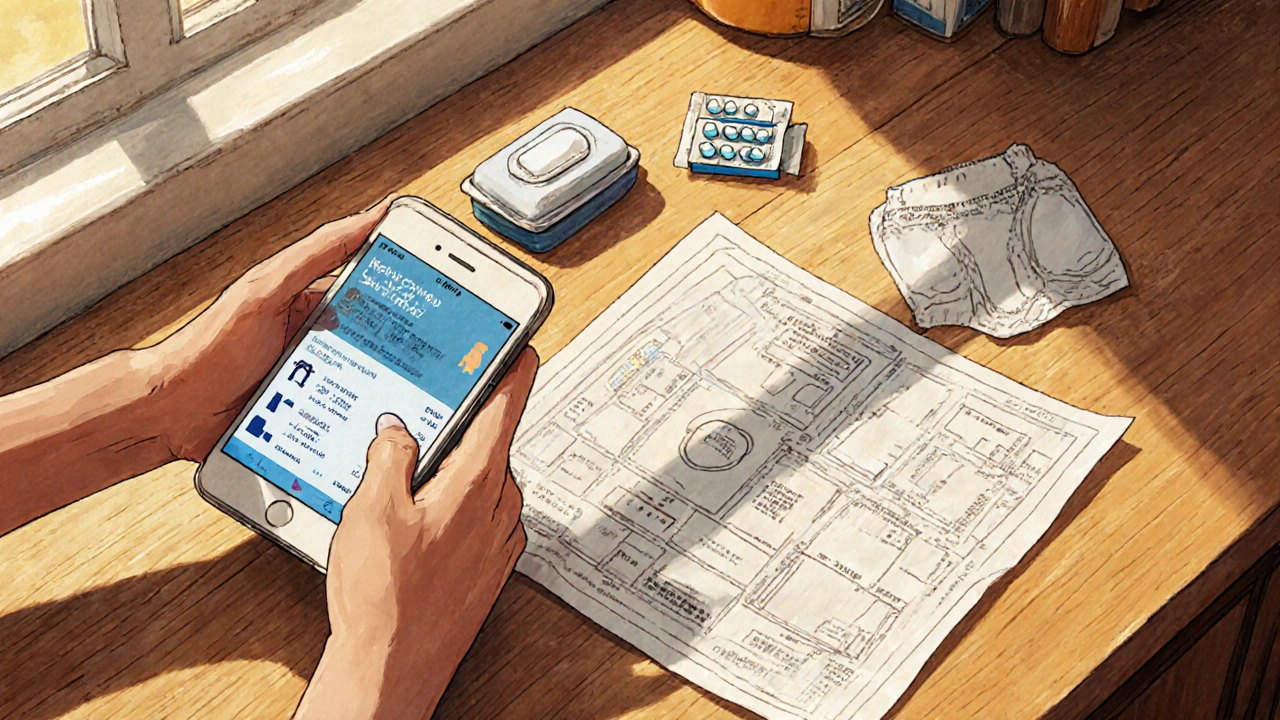How to Navigate Social Situations While Living with Proctitis

Living with proctitis can feel like walking a tightrope in everyday social settings. You’ve got flare‑ups, urgent bathroom trips, and sometimes uncomfortable symptoms that make casual gatherings feel like logistical hurdles. The good news? With a few practical moves, you can keep the embarrassment at bay, stay connected with friends, and protect your wellbeing.
What Is Proctitis?
Proctitis is a type of inflammation that affects the lining of the rectum. It often shows up as rectal bleeding, pain, and an urgent need to empty the bowels. While it can appear on its own, it’s frequently linked to broader inflammatory bowel disease (IBD) such as ulcerative colitis. Understanding the condition’s medical side helps you explain it clearly when the conversation turns to health.
Why Social Situations Feel Different
Even though proctitis is a medical issue, its impact stretches far beyond the bathroom. Here’s what typically trips people up:
- Urgency. The sudden need to find a restroom can interrupt meals, movies, or meetings.
- Embarrassment. Blood or mucus can cause self‑consciousness, especially in public.
- Medication timing. Some drugs (e.g., mesalamine, steroids) work best on a schedule, and missing a dose may trigger symptoms during a social event.
- Dietary restrictions. Spicy foods, caffeine, or alcohol might have to be limited, influencing what you can enjoy at gatherings.
- Stigma. Talking about bowel health is still taboo for many, which can make disclosure feel risky.
Plan Ahead: Practical Preparations
Preparation reduces uncertainty. Before you step out, run through a quick mental checklist:
- Identify bathroom locations. Use apps like Restroom Map or just scan the venue’s floor plan online.
- Pack a discreet symptom kit: a small bag with toilet paper, wet wipes, a spare pair of underwear, and any medication you might need.
- Check your medication schedule. If a dose is due within a few hours of the event, set an alarm to ensure you don’t miss it.
- Eat a “safe” meal a few hours before the event. Stick to low‑fiber, low‑spice foods that you know sit well with your gut.
- Inform a trusted friend or host about your condition, if you feel comfortable. A simple heads‑up can make them more understanding if you need to step out.

Communicating Your Needs Without Over‑Sharing
People often ask, "Do you need help?" or "Are you okay?" Your answer can be brief yet clear. Try these scripts:
- "I have a condition called proctitis that sometimes requires quick bathroom breaks. I’m fine, just let me know if you need anything."
- "I’m on a medication that I need to take at regular intervals. I might step out briefly, but I’ll be back right away."
- If you prefer not to name the condition, say, "I have a chronic gut issue that can cause sudden urgency. Thanks for understanding."
Choosing how much to disclose depends on your comfort level and the social context. Below is a quick comparison of disclosure strategies.
| Strategy | When to Use | Pros | Cons |
|---|---|---|---|
| Full name (Proctitis) | Close friends, support groups | Clear, reduces repeated explanations | May feel too personal for acquaintances |
| General term (chronic gut issue) | Work or casual gatherings | Maintains privacy | May lead to follow‑up questions |
| Non‑verbal cue (step out discreetly) | Large events, noisy venues | Least intrusive | Can cause confusion if not pre‑explained |
Managing Symptoms on the Fly
Even with the best prep, a flare‑up can happen. Here’s how to stay calm and keep the situation under control:
- Deep breathing. It helps reduce the urgency sensation and can lower anxiety‑related bowel movements.
- Hydration. Sipping water keeps stools soft, which can ease painful passes.
- Positioning. When you get to a bathroom, sit with knees higher than hips (a footstool works) to promote smoother bowel movements.
- Quick medication. If you have a rescue dose (e.g., a short‑acting steroid), keep it with your kit for sudden flare‑ups.
- Know the exit routes. Identify the nearest restroom before you sit down, so you don’t have to scramble later.
Dealing With Social Anxiety and Confidence
Living with a chronic illness often builds an extra layer of social anxiety. Here are three mental‑health tools that pair well with the practical steps above:
- Cognitive‑behavioral techniques. Challenge thoughts like "Everyone will think I'm weird" with evidence (most people are focused on their own experience).
- Mindfulness practice. A five‑minute body scan before a social event can help you notice tension without judgment.
- Support‑group participation. Hearing how others handle similar situations normalizes the experience and offers fresh ideas.

Building a Support Network
Even if you’re not ready to talk about proctitis with every friend, having at least a couple of allies makes a world of difference. Consider these avenues:
- Online forums. Communities like Reddit’s r/IBD or dedicated bowel‑health groups offer anonymity and practical tips.
- Local meet‑ups. Some cities host chronic‑illness social groups; check Meetup.com for a New Zealand chapter.
- Healthcare team. Your gastroenterologist or nurse can suggest patient‑advocacy resources and provide a medical note if needed for work or school accommodations.
Quick Checklist for Social Events
- Scout bathroom locations (online map or venue website).
- Pack a discreet symptom kit (wipes, spare underwear, meds).
- Set alarms for medication timing.
- Eat a gut‑friendly meal a few hours prior.
- Prepare a short disclosure line if you’re comfortable sharing.
- Practice a calming breath technique before the event.
- Identify a trusted friend to give a heads‑up.
Frequently Asked Questions
Can I still travel abroad with proctitis?
Yes. Carry a doctor’s note for medication, research restroom availability at airports, and bring a portable kit. Adjust your diet before long flights to avoid triggers.
Is it okay to tell my boss about proctitis?
If you need flexible break times or a nearby bathroom, a brief disclosure can help arrange reasonable accommodations under workplace health policies.
What foods should I avoid before a party?
Spicy sauces, high‑fat fried foods, caffeine, and alcohol are common triggers. Stick to boiled vegetables, lean proteins, and low‑fiber carbs.
How do I handle accidental leaks in public?
Stay calm, head to the nearest restroom, change into your spare underwear, and wipe clean. A discreet, pre‑packed kit makes the process faster and less stressful.
Do I need a medical note for university exams?
Most universities accept documentation for chronic conditions. Request a note from your gastroenterologist outlining the need for extra bathroom breaks.
Navigating social life with proctitis isn’t about hiding who you are; it’s about smart planning, clear communication, and building a support circle that respects your needs. By applying these steps, you’ll find that you can still enjoy gatherings, work events, and travel without letting the condition dictate every decision.
nitish sharma
October 17, 2025 AT 21:41Thank you for publishing such a thorough guide on living with proctitis. Your step‑by‑step checklist demonstrates a keen awareness of both medical and social dimensions. I especially appreciate the emphasis on discreet symptom kits, which can mitigate embarrassment. The inclusion of communication scripts is both practical and respectful. This post will undoubtedly empower many readers to navigate gatherings with confidence.
Rohit Sridhar
October 28, 2025 AT 20:41First off, kudos for tackling a topic that many shy away from discussing. Proctitis can feel like an invisible barrier that makes social life feel treacherous, but your strategies turn that barrier into a bridge. Planning ahead, such as scouting restrooms, gives you control over the narrative rather than letting symptoms dictate the agenda. Packing a discreet kit is a game‑changer; it removes the element of surprise when nature calls. Setting alarms for medication timing not only ensures therapeutic efficacy but also signals to yourself that self‑care is a priority. The suggested \"safe meals\" before events are spot‑on, as diet is often the silent trigger we overlook. Your scripts strike a perfect balance between honesty and brevity, allowing friends to understand without feeling overwhelmed. Remember, you don’t need to share every detail-just enough to keep the social flow smooth. Breathing exercises can calm the nervous system, which in turn can reduce urgency, a fact many overlook. Hydration, while simple, is a cornerstone of soft stool consistency and should never be underestimated. Positioning yourself with a footstool replicates the natural squatting posture, easing passage and reducing pain. If an unexpected flare‑up strikes, having a rescue medication on hand can prevent the situation from spiraling. Identifying exit routes ahead of time eliminates the frantic scramble that can amplify anxiety. Building a support network, be it online forums or trusted friends, creates a safety net that reinforces resilience. Ultimately, your proactive mindset transforms what could be a source of shame into an act of empowerment, and that shift in perspective is the most powerful tool of all.
Sarah Hanson
November 8, 2025 AT 20:41Thx for sharing – super helpful!
Nhasala Joshi
November 19, 2025 AT 20:41OMG, did you ever consider that the \"Restroom Map\" app is actually a front for covert surveillance? 🕵️♀️ The elite \"bio‑signal\" conspiracies suggest that every urgent dash is logged by hidden sensors, turning your bathroom breaks into data points for the Great Gut‑Control Initiative! 🙀🚽 If you’re not already wearing a anti‑tracking waistcoat, you’re basically volunteering for the \"Colon Census.\" 🤯💥 Stay woke, and maybe carry a tin foil hat in your symptom kit – just in case the \"microscopic drones\" decide to eavesdrop on your bowel’s private conversations. 😈🛡️
kendra mukhia
November 30, 2025 AT 20:41Honestly, this guide feels like a watered‑down version of what real sufferers need. The checklist is cute, but it sidesteps the deeper emotional toll that proctitis drags into every conversation. You’re preaching surface‑level hacks while ignoring the existential dread of being labeled \"the person with the bathroom habit.\" If you truly want to help, acknowledge the shame cycle and provide strategies to dismantle it, not just a spare pair of underwear.
Bethany Torkelson
December 11, 2025 AT 20:41Look, the emotional weight you mention is real, but the practical tips aren’t \"cute\" – they’re lifesavers. Ignoring the psychological aspect while delivering concrete tools is a balanced approach, not a dismissal. You can’t expect every post to be a therapy session; sometimes a spare pair of undies is enough to keep someone from spiraling. So, before you criticize, recognize that actionable advice does matter.
Grace Hada
December 22, 2025 AT 20:41Our bodily constraints are merely reflections of societal expectations; accepting them without critique perpetuates oppression.
alex montana
January 2, 2026 AT 20:41Wow!!!...??; you really think a footstool solves everything??!!
Wyatt Schwindt
January 13, 2026 AT 20:41Great points on planning and breathing; those simple habits make a big difference.